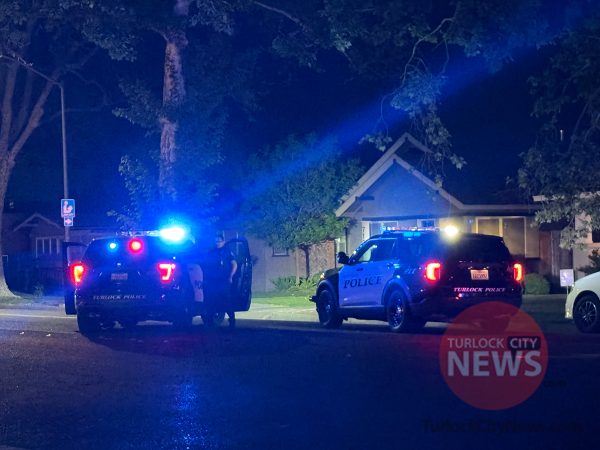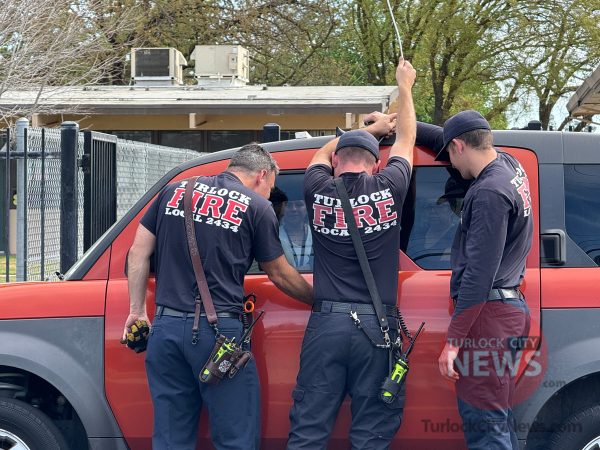The Turlock City Council made tough cuts and used $2.6 million in reserves to pass the 2009-10 budget. A Budget Sub-Committee was formed that consisted of Mayor John Lazar and Vice Mayor Ted Howze. Through the request and recommendation of Councilman Spycher, the Budget Sub-Committee would continue to address pending issues such as funding $600,000 in street and signal light expenditures and funding $300,000 in fleet maintenance deficit.
Through the state’s proposed budget and raiding of funds that should be sent down to local government agencies, the initial estimate for Turlock’s potential loss could equal around $5 million. This would obviously be an unexpected loss of revenue that Turlock would have to address by either using reserves and/or making more cuts. On July 1, 2009, 23 City of Turlock employees lost their job due to budget cuts.
Legislative leadership and Gov. Arnold Schwarzenegger, also known as the Big Five, met multiple times last week to attempt to resolve the State of California’s deficit. The budget gap was estimated at $26.3 billion.
The states proposed actions to take gas taxes and redevelopment funds for general fund use has already been ruled unconstitutional in court.
On April 30, 2009 the Sacramento County Superior Court ruled taking redevelopment funds that are specifically used to redevelop blighted areas and use them for general fund expenses is unconstitutional.
On June 30, 2009 The Sacramento Third Appellate Court ruled using the specifically allocated gas tax for general fund expenses was also unconstitutional.
During a June 29, 2009 Senate Floor debate, Senator Jeff Denham read the oath the Senators took to bear true faith and allegiance to the Constitution of the United States and California.
“This is very clear, black and white in here,” said Senator Denham. “You’re ignoring the Constitution Article 13A which says any changes in state taxes enacted for the purpose of increasing revenues by not less than a two-thirds vote.”
Denham went on to say “Article 19B states it again, it’s very clear. This will go to the courts, this will be undone, we will be back here again.”
The League of California Cities urges people to take action by calling their Assembly Member and Senator at their district office and urge them to oppose all proposals that will devastate city services by stealing local gas tax and redevelopment funds, and borrowing property tax revenues when repayment is in doubt.
Local counties and cities are rallying together to oppose the proposed California State Budget that calls for raiding Highway User Tax Account (HUTA), seizing Redevelopment Agency funding, and Proposition 1A loans.
Turlock Mayor John Lazar Press Conference Speaking Points:
– With the recent announcement of the State of California taking local Government funds, such as RDA money, Highway Users Tax and Property Tax money, it needs to be realized what impacts those actions will have on local government
– The taking of those funds from our cities will impact the safety of our communities, the revenue generated for our communities, as well as the revitalization of local government.
– RDA funds are crucial to our Public Safety Facility and the rebuild of the Turlock Carnegie Arts Center. Those planned efforts must not be stopped by the irresponsible actions of the State.
– Our roads will continue to suffer if the State takes the Highway Users Tax. The money to maintain and ensure safe roads will be jeopardized, putting a greater impact on Public Safety to keep our citizens safe while on our roads. Additionally, critical positions funded by these monies to maintain our roads will be placed in jeopardy.
– Under the City of Turlock’s General Fund, we recently had to lay off employees in order to balance our budget. Twenty-three employees were let go. Our organization, as well as our community, is realizing the negative effects of those vacancies. We have balanced our budget by making difficult decisions – the State must do the same and not shift the burden of their reckless spending to local government.
– Our State and economy is in a critical spiral downtown with crippling effects. Robbing Peter to pay Paul is no longer a viable solution.
Senator Denham released a statement late Wednesday night saying “I refuse to vote for a budget that will dump 27,000 criminals back on our streets, force the laying off of local cops and cuts access to the courts, making it harder to prosecute those that recommit crimes.”
The League of California Cities explains what each of these three fund raids entail while also comparing the State of California’s budget proposal to a “reckless Ponzi scheme.”
The proposed $1.7 billion HUTA gas tax grab is part of the potential budget deal. This proposal includes a seizure of $986.3 million of city and county HUTA funding in FY 2009-10, and an additional $750 million for FY 2010-11 to pay for transportation debt services.
Multiple Redevelopment Proposals
The Big Five are currently discussing three illegal proposals related to redevelopment funds. The combined hit is $1.7 billion.
Under this proposal, agencies could borrow from existing balances in their low- and moderate-income housing funds. Agencies that do not or could not make their Educations Revenue Augmentation Fund (ERAF) payments would have to suspend all activities and begin setting aside 30 percent of tax increment for housing. Agencies making the payments would receive a one-year extension on their redevelopment plan limits for receiving tax increment.
An alternative proposal sponsored by the city of Industry, that faces both political and legal challenges, would allow RDA project timelines to be extended for 30-40 years. In exchange, RDA’s would be required to give the state 10 percent of revenues which the state would securitize. There are a variety of hybrid versions of this proposal also being discussed. (If this proposal is accepted, the concept is to limit other budget hits to local government.)
Cities are still threatened by a Proposition 1A loan despite earlier statements by Legislators coming out of the June Budget Conference Committee that they “saved” local governments from taking property taxes. A property tax loan puts cities in a precarious position. If the state borrows property taxes, it will be extremely challenging for cities to secure financing to securitize the loan against the state’s repayment promise. State Treasurer Bill Lockyer has warned that Wall Street is poised to downgrade the state’s bond rating again. This would mean that it will be even more expensive for cities forced to securitize a Prop. 1A loan. Moreover, legislative borrowing only compounds the state’s budgetary problems by “kicking the can down the road.”
League of California Cities Condemns Proposed State Budget as Reckless Ponzi Scheme.
Sacramento (July 21, 2009) – California’s legislative leaders and Gov. Arnold Schwarzenegger have agreed on a proposal to “balance” the state budget with illegal raids of local government gas tax, public transit and redevelopment funds, according to recent court decisions and a legal analysis obtained by the League of California Cities, as well as a “loan” of local government property taxes that is unlikely to be repaid. By relying on illegal mechanisms and fund shifts, this budget resembles a Ponzi scheme that the League of California Cities condemns in the strongest possible terms.
The classic Ponzi scheme works on the “rob-Peter-to-pay-Paul” principle. Money from new investors is used to pay off earlier investors until the whole scheme collapses. Meeting in secret, the Big Five have put together a state budget that relies on unconstitutional seizures of local taxpayers’ funds or “loans” from local taxpayers to finance today’s state operating expenses. This recipe for disaster passes off responsibility for repayment or complying with future court orders to reimburse local governments to future governors, legislatures and taxpayers.
As they have in the past, courts are expected to enjoin the state from implementing its unconstitutional raids of local gas tax, public transit and redevelopment funds. Further, given California’s negative fiscal outlook, the League believes it is illusory to maintain that the state will be in a position to repay the “borrowed” property tax funds in a few years.
League President and Rolling Hills Estates Mayor Judith Mitchell reacted strongly to the budget proposal. “Cities across the state have suffered deep revenue losses and acted responsibly to cut spending by laying off staff, shutting public facilities, and eliminating programs. While some at the state level will try to pass this proposed state budget off as a major breakthrough, city leaders know it only passes the buck and the problem to the future. As an elected official who took an oath to protect and defend the state constitution, I am embarrassed that any state officials would propose a blatantly unconstitutional budget that promises to fail within weeks of its adoption.”
“This budget proposal is a reckless Ponzi scheme because it depends on unconstitutional seizure of billions in local revenues that the voters dedicated to specific purposes and questionable borrowing provisions,” said Chris McKenzie, League executive director. “It also puts government’s most important responsibility—protecting public safety—at risk because it takes local property tax revenues that should be used to patrol the neighborhoods of the cities of California and to respond to the many fire, police and emergency medical calls that cities in California receive. We have assured state officials we will see them in court the day after a budget is signed if it contains Senator Jeff Denham has been arguing that the State of California should sell off billions of dollars worth of assets, surplus properties, to help close the $24 billion plus deficit.
Established in 1898, the League of California Cities is a nonprofit statewide association that advocates for cities with the state and federal governments and provides education and training services to elected and appointed city officials.






